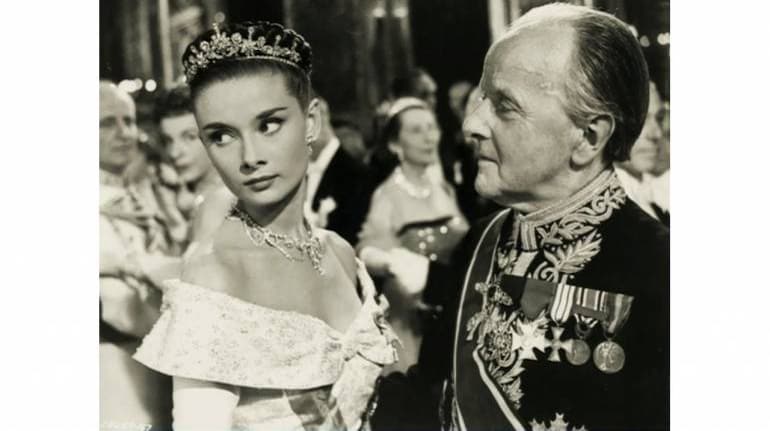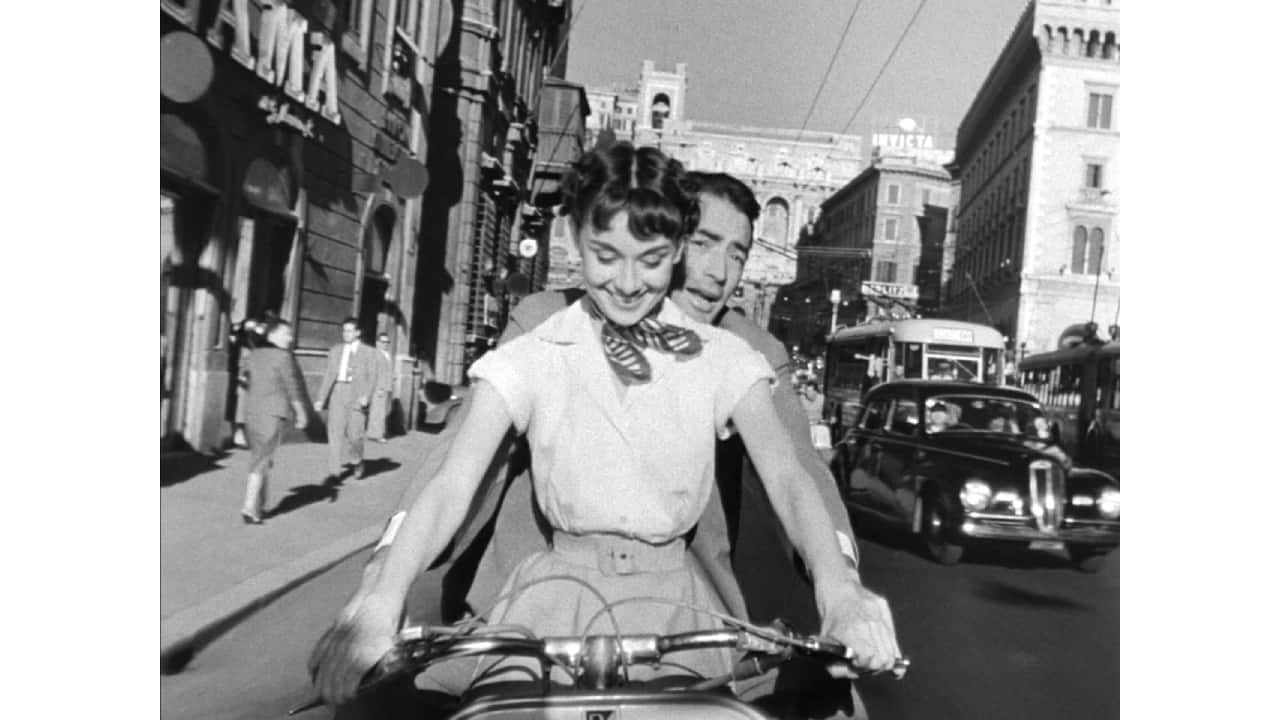
Almost exactly 70 years ago, Roman Holiday was released on September 2, 1953. I watched it last week for the umpteenth time—it’s free to view on the net. Seven decades after it was made, it has lost none of its freshness and charm—a love story that is great fun and is also deeply moving. If I had the authority to do so (which I should never be allowed to have), I would make it required viewing for young people to figure out their way in a world of confusing choices.
Ann, crown princess of an unnamed country, is on a whirlwind tour of Europe. She is a bird in a golden cage where every minute of her day is planned for her by her royal courtiers. She longs for a taste of freedom and normal life. One night in Rome, she slips out of her palatial embassy, walks around the streets and falls asleep on a roadside bench.
 Audrey Hepburn and Gregory Peck (Image from the trailer for the film Roman Holiday via Wikimedia Commons)
Audrey Hepburn and Gregory Peck (Image from the trailer for the film Roman Holiday via Wikimedia Commons)
Joe Bradley, an American reporter, finds her. Concerned for her safety, he takes her to his home. Next morning, when he realizes who she is, he promises his boss that he will get him an absolutely exclusive story on the princess.
Joe doesn’t reveal to Ann that he is a journalist and offers to show her around Rome. Hilarious incidents pile up as they wander the city. For the first time in her life, Ann feels fully free, can give in to her impulses and do as she pleases.
By the end of the day, Ann can no longer hide her real identity and Joe cannot hide the fact that he knew it all along. They also know that they are in love. But the princess feels she needs to return and resume her royal responsibilities.
Roman Holiday is the perfect reverse-Cinderella story. In the fairy tale, a commoner turns into a princess for a short while, falls in love with Prince Charming, and then reverts to her commoner self at the stroke of midnight. Here, Princess Charming turns into a commoner, falls in love with a commoner and has to go back to her princess self at midnight.
I won’t reveal how the story ends. But in pure cinema terms, the final 30-second shot which plays out in almost complete silence is quite extraordinary for a 1950s film produced by a major Hollywood studio. It could leave you speechless for a few moments.
What makes Roman Holiday so timeless? Possibly because it balances two apparently unrelated concepts—freedom and sacrifice. Neither Ann nor Joe is free—Ann is shackled by her royal status and Joe works at a dead-end job for meagre pay. But when they meet, they end up freeing each other. Ann becomes a self-assured woman and Joe discovers a code of honour. Yet, to attain these freedoms, both must make great sacrifices.
But let’s leave all this philosophical analysis to academics. The obvious truth is that the film brims over with a sheer spirit-uplifting joy that transcends time and geography. It celebrates living life in the here and now without losing one’s moral anchor.
At the centre of the film’s charm are the divinely graceful Audrey Hepburn and Gregory Peck at his charismatic peak. Hepburn as Ann is luminous in her innocence, wonder and that everpresent hint that she could break out in childish mischief at any moment. Peck is magnificent in the sheer ease with which he carries Joe from being just another loser to a man of honour. In the last half-hour of the film, Peck brings into his eyes and smile a gentle protectiveness—and finally pride—that Joe feels for Ann that anyone who has ever been in love would die for.
Cinema is a director’s medium. William Wyler is today a forgotten name. He won three Best Director Oscars, but not for Roman Holiday. The very fact that he could make such an intimate romantic film and also a massive-budget epic like Ben-Hur—for which he won one of his Oscars—is testimony to the man’s range and talent.
Roman Holiday’s ending is an emotional paradox—it is both happy and poignant. In real life too, the film had a remarkably similar closing. The story and screenplay were by Dalton Trumbo, one of Hollywood’s great writers. But this was the era of the McCarthy-ite anti-Communist witch hunts. Trumbo had been blacklisted by Hollywood for his political beliefs and was living in exile in Mexico.
The film won the Oscar for Best Story, but the award went to Ian McLellan Hunter, Trumbo’s friend who was fronting for him because the studios were too scared to reveal that they were still giving work to Trumbo.
It was only in 1993, 40 years after Roman Holiday was released and 17 years after Trumbo had passed on, that the Academy of Motion Picture Arts and Sciences credited the win to Trumbo and changed its records. It took another 10 years for his name to get its rightful place in the opening credits, when the film was digitally corrected to be released on DVD in 2003. As bittersweet an ending as Trumbo could have thought up for one of his tales.
Discover the latest business news, Sensex, and Nifty updates. Obtain Personal Finance insights, tax queries, and expert opinions on Moneycontrol or download the Moneycontrol App to stay updated!